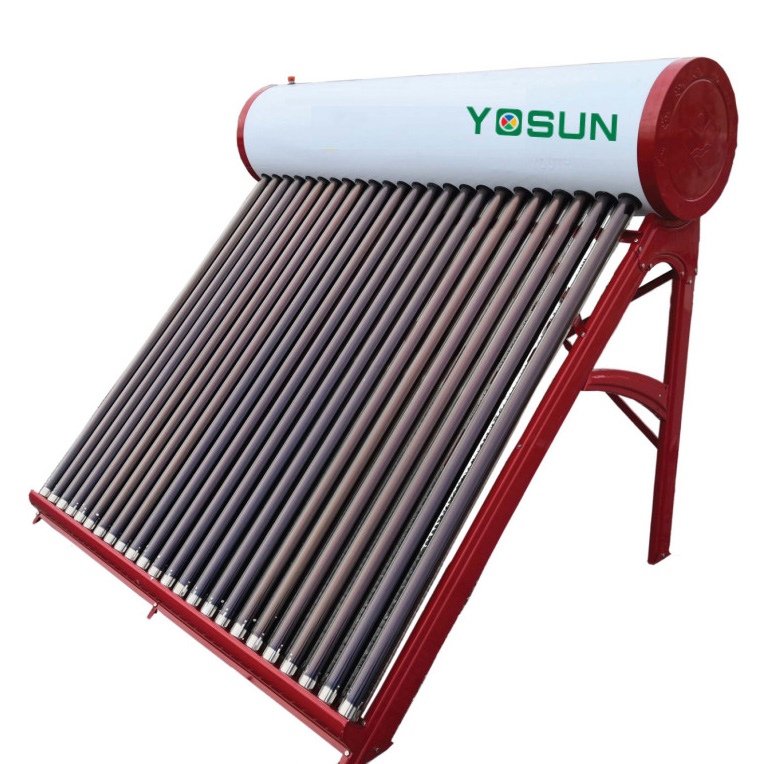Solar water heaters, like other green technologies, come with a higher price tag but offer energy savings over the long term.
A solar water heater sits on a rooftop in Brazil. 110 Hot Water Heater

Taking a hot shower can literally mean pouring money down the drain.
The average American household can spend between $53 and $70 per month using an electric water heater. If you spend a little extra time in the shower, that cost can pile up even higher.
Turning down your water heater's temperature can save you some money on water heating costs, which account for 14% to 18% of your home's monthly energy budget, according to the Department of Energy. But replacing or supplementing your current water heater with a solar-powered water heater could, too.
Can solar panels save you money?
Interested in understanding the impact solar can have on your home? Enter some basic information below, and we’ll instantly provide a free estimate of your energy savings.
Solar water heaters harness the sun's energy to provide a sustainable solution for heating water in the home. While solar water heaters have gained immense popularity in countries where electricity costs are high, they've been slower to catch on in the United States, but could be a compelling option for cash-strapped Americans.
Here's what you need to know about the ins and outs of solar water heaters and how you can use them to reduce your carbon footprint and save money.
Can solar panels save you money?
Interested in understanding the impact solar can have on your home? Enter some basic information below, and we’ll instantly provide a free estimate of your energy savings.
Solar water heaters vary in design, efficiency, capacity and price, but they all replace a good chunk of the gas or electricity used to heat water with clean, free sunlight. The three basic designs all have a way to collect heat, a tank to store hot water, backup heating for when your system can't keep up and a circulation system.
Batch collector water heaters heat water in tubes or pipes, usually painted black to collect more of the sun's heat. Cold water can be mixed in periodically to keep water from getting too hot. These heaters are best suited for warmer climates. Where freezing might be an issue, they'll need to be drained during cold months to avoid damage to the system.
Flat-plate collectors rely on a metal plate, often painted black, to soak up the sun's heat. Heat travels from the plate to water-filled tubes. The water cycles through heating tubes to and from the storage tank, keeping the stored water hot.
Evacuated tube collectors are the most efficient models out there. Water is heated in a tube that's surrounded by a larger, vacuum-sealed glass tube. Very little heat is lost because there's no air between the heating liquid and the outside world.
Solar water heaters can heat water directly or indirectly. In indirect heaters, the sun heats a heat transfer liquid (often a water and propylene glycol mixture), which transfers its heat to water in a tank. Because the freezing point of the heat transfer liquid is lower than that of water, the system can operate in colder climates. For example, evacuated tube collectors can work in temperatures as low as minus 40 degrees Fahrenheit, according to the US Environmental Protection Agency.
Buying a solar water heater is more complex than browsing an online marketplace like Amazon, selecting a water heater, paying and logging out, said Jake Edie, an adjunct professor at the University of Illinois in Chicago who teaches a course on clean energy in the electric grid.
Much like other clean energy options, Edie says, solar water heaters require a substantial upfront investment in exchange for long-term gains and cost savings throughout their useful life span.
Solar water heater on a roof in Spain.
Here are some steps in purchasing a solar water heater system.
When it comes to solar water heaters, there are two primary types: active solar water heating systems and passive solar water heating systems.
Active solar water heaters use a pump to circulate the heated liquid and can be divided into two types: direct and indirect circulating systems. Active solar water heating systems are generally more expensive, but are the common type installed in the US, according to the EPA.
Passive solar water heaters don't have pumps to move hot and cold water around. They come in two distinct variations: integral collector-storage systems and thermosiphon systems. Passive solar water heaters are known for their reliability, cost-effectiveness and durability, but don't allow for some of the finer control of active systems.
The cost of a solar water heater can vary widely depending on the type, size and installation requirements. On average, you can expect to pay between $2,000 and $5,000 for the system, with installation costs adding $1,000 to $3,000. Despite the upfront costs, solar water heaters can provide savings over time through reduced energy bills.
In the United States, solar water heaters qualify for a federal tax credit, sitting at 30% of the total cost through the end of 2032. So for a system that costs $3,877, you would be eligible to receive back $1,163 when you file your taxes.
Like any technology, solar powered water heaters have pros and cons.
Solar-powered water heaters are an excellent means to reduce your overall electricity expenses, but they come with challenges, Edie said. For instance, he talked about cloudy days or at night when solar panels can't generate power, which is when water heaters will be unable to produce hot water.
Here's a further breakdown of the pros and cons.
Correction, Aug. 18: This story originally presented as direct quotations some statements that were actually paraphrases of what the cited individual had said. Those passages have now been rendered appropriately as paraphrases.
Best Solar Products and Companies

Solar Thermal Heat Exchanger Living Off the Grid Series